-
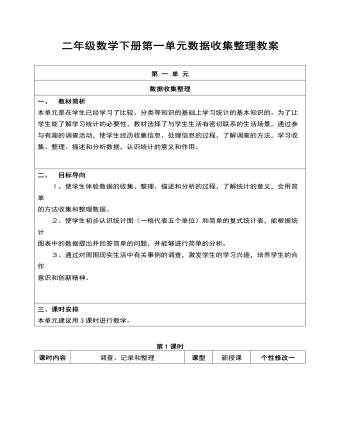
二年级数学下册第一单元数据收集整理教案
问题情景,导入新课1、多媒体课件出示例1主题图,问:图上的小朋友在干什么?你们测量过体重吗?测量了几次?读一年级刚入学时,你测量的体重是多少?(学生自由汇报各自的体重情况)怎样才能让大家一看就明白我们班所有人的体重情况呢?二、活动体验,探究新知1、电脑出示统计表(1): 体重(千克)15以下16~20 21~25 26~30 31以上人数 师:现在我们就用“正”字记录法来统计一下刚入学时的体重(集体活动)2、活动结束后,师生共同将收集的数据整理后填入表格中。3、二年级时,我们的体重有什么变化呢? 电脑出示统计表(2) 体重(千克)15以下16~20 21~25 26~30 31以上人数 集体进行统计活动,并将结果填入表中。4、讨论:如果想把两年的体重数据填入一个统计表中,该如何表示呢? 学生讨论后,在黑板上出示表格(3):(单位:千克)

新人教版高中英语必修3Unit 5 The Value of Money-Listening &Speaking&Talking教学设计
4. A:We’d like to have someone to say a word at the beginning to welcome the group.B:↙Who?A:We thought that you or Dr.Johnson might do it.B用降调说Who,其意思是问,对方想让谁在开场时致欢迎词。Step 6 Pronunciation---Practice1. Listen to the short conversation and mark the intonation with ↗, ↙ or ↙, ↗. Then discuss with a partner what they intend to convey by using different intonation.Owner: You know what ?↗ It’s a million-pound bank note↙.Waiter 1: Really ?↗(question)Waiter 2: Really !↙(unbelievable and surprised)Waiter 3: Really ?!↙↗(first question then surprised)2. Listen to the conversations. Underline the parts that are stressed and mark the intonation. Then talk about the implied meanings of the responses with different intonations. Listen again and repeat.1) Henry: It’s a nice suit.Owner: Oh, it’s perfect!↙(The intonation means it is very suitable for Henry.)2) Henry: Well, that’s very kind of you.Owner: Kind, sir ?↗(what you said is not right) No, it’s kind of you. You must come whenever you want and have whatever you like. Just having you sit here is a great honour !!↙(welcome you to come again)3)Henry:Well, to be honest, I have none. Oliver:(happily) What luck!(excited) Brother↗, what luck!↙(It means “Didn’t you hear it?”)Henry: Well, it may seem lucky to you but not to me!↗(angry) If this is your idea of some kind of joke, I don’t think it’s very funny. Now if you’ll excuse me, I ought to be on my way.↙(If so, I would leave.)Roderick: Please don’t go↙...(hope Henry can wait for a moment)Part B Viewing and Talking---Describe people’s changing attitudes in a film clipStep 1 Before-listening---Tell the filmYou are going to watch part of the film The Million Pound Bank Note. Look at these photos and guess what happens in the film.

新人教版高中英语必修3Unit 5 The Value of Money-Listening &Speaking教学设计
Step 4: Listen again and decide if the following statements are true (T) or false (F).1 It was the first time Chen Liyan's story was reported. T口 F口2 Chen found 10,000 yuan in a small plastic bag in Taiyuan railway station口 F口3 Wang Zheng apologized to Chen because he couldn't offer her more money. T口 F口4 Chen took out a large loan to cure her daughter, T口 F口5 Wang set up a fundraising website for Chen's daughter after Chen told him about her situation. T口 F口Step 5:After listening, discuss the questions.1 What kind of person do you think Chen Liyan is?Chen Liyan is generous and honest because she returned a large sum of money to the owner.2 Did Chen return the money because she didn't need it?No. She returned the money because it was the right thing to do. Evidence for this is that she refused to accept the reward money because she felt that it had not been earned. 3 Is it common for people to do what Chen did?It depends on the culture. In some countries it is quite common to return money that has been found. In other countries, people believe "Finders are keepers!" 4 How did Wang Zheng feel about the return of his money?He must have been very happy and relieved to have gotten his money back. We know this because he thanked Chen repeatedly and even offered her a reward.5 Why did Ma Dongbao tell Wang about Chen's family?He must have had great sympathy for Chen and her daughter and wanted to help them.'We know this because he arranged help for them. 6 How did the news reporter feel about Chen's actions?The news reporter felt that it showed that money wasn't the most important thing in life. We know this because the reporter told us that this is what Chen believes. and then said, “that's a great attitude to take."

新人教版高中英语必修3Unit 5 The value of money-Reading and Thinking教学设计二
? Could you offer me some kind of work here?? I don’t want your charity, I just want an honest job.? Careless: I landed in Britain by accident.Step 7:Consolidation.? Find Henry? Roderick and Oliver were I .making a bet when they saw Henry, a poor young man. ? Know Henry? About a month ago, Henry was sailing and later he found himself carried out to sea by a strong wind. Fortunately, he 2.was spotted by a ship. And it was the ship that brought him to 3.England? Offer money to Henry ? Oliver and Roderick gave Henry a letter and told him that there was money in it. They 4.persuaded him to accept it, and made him 5.promise that it wouldn't be opened until 2 o'clock.Step 8:Language pointsa large amount of: a large quantity of; a great deal ofe.g. They bought a large amount of furniture before they moved their new house.make a bet: make an arrangement to risk money, etc. on an event of which the result is doubtful.e.g. We made a bet on the result of the match.permit sb to do something: allow somebody to do somethinge.g. My mother doesn’t permit me to ride in the street after it rained.by accident: as a result of chancee.g. I only found it by accident.stare at: look at somebody or something with the eyes wide open in a fixed gaze( in astonishment, wonder, fear, etc)to be honest: to tell you the truth; to be franke.g. To be honest, I don’t think we have a chance of winning.Step7 Homework:What do you think will happen to Henry? Will the bank-note help him or get him into trouble?

新人教版高中英语必修3Unit 5 The Value of Money-Reading for Writing教学设计二
2. 您能看到, 我头发太长了。You can see that my hair is much too long.3. 无论什么时候, 只要您想回来就回来。Please come back whenever you want.4. 您仅有很少的头发要理! You only have too little hair to cut !5. 为您服务是我的荣幸!It is my honour to serve you!Step 9 Writing(Henry is walking down the street when he sees a sign for a place that cuts hair. He decides to have it cut. )H=Henry B=BarberH: Good afternoon, I’d like to have my hair cut, if I may. (The barber looks at Henry’s hair and continues cutting another man’s hair. ) Er, I’d really like a haircut. As you can see it’s much too long. B: (in a rude manner) Yes, I can see that. Indeed, I can. H: Fine, well, I’ll have a seat then. (He sits in one of the barber’s chairs. The barber turns to look at Henry. )B: It’s quite expensive here, you know! Are you sure you can afford it?H: Yes. I think so. (After his hair is cut, the barber tells Henry how much he must pay. Henry shows the barber the bank note. )B: Why Mr. . . (looks shocked)H: Adams. Henry Adams. I’m sorry. I don’t have any change. B: Please don’t worry! (wearing a big smile) Nothing to worry about! Nothing at all! Please come back whenever you want, even if you only have too little hair to cut! It will be my honour to serve you!Step 10 Pair workExchange drafts with a partner. Use this checklist to help your partner revise his/her draft.1. Are all the elements of a play included and in good order ?2. Do the character use suitable language ?3. Are the stage directions clear and useful ?4. Is the plot clear and exciting enough ?

新人教版高中英语必修3Unit 5 The Value of Money- Discovering Useful Structure教学设计
Step 3 Meaning1. 过去将来时表示从过去某一时间来看将要发生的动作或存在的状态, 常用在宾语从句中。一般由“would/should +动词原形”构成。She hoped that they would meet again someday. 她希望将来有一天他们能再见面。2. was/were going to+动词原形: 表示过去将要发生或很有可能发生的动作, 常用于口语中, 表示预言、意图或者打算等。He was going to start work the following week. 他打算下星期开始工作。3. was/were about to do: 常用来表示即将发生的动作, “刚要/正要做……”。注意该结构不与任何时间状语连用。I felt that something terrible was about to happen. 我感到某种可怕的事情即将发生。4.was/were to do: 表示“曾计划做某事”, 如果表示“本来计划做某事, 动作没实现”, 则需用 “was/were to have done”。She said she was to have told me about the accident. 她说她本来想告诉我关于事故的事。5.Start, go, come, leave, see, meet等动词的过去进行时: 表示就过去某一时刻而言即将发生的动作。She was coming later. 她随后就来。I had just put on my overcoat and was leaving to visit a friend of mine. 我刚穿上外套要去看我的一个朋友。

新人教版高中英语必修3Unit 5 The Value of Money-Reading and Thinking教学设计一
Everybody wants to get wealth.In today’s material world,making money or becoming wealthy symbolizes a person’s success and capability. Many people just make every effort, pay any price to attain greater wealth. With money,they can buy nice, large apartments in nice neighborhood. With money they can own luxurious cars. Wealth seems to bring all happiness in life.But is wealth the only road to happiness? Not really. There are many things in the world, which are beyond the means of money, such as friendship, love, health and knowledge. People are so preoccupied with struggling for money that they have no time or would not take the time to form or maintain friendship. What happiness can they feel living as lonely miserable creatures without love or friends in the world even if they accumulate tremendous wealth?In my opinion, people can’t do anything without money, but money is not everything. What money will bring you depends on your personal belief and goal in life. If you are kind enough to help others, especially the poor, money is a good thing to you. With it, you can do much more for the benefit of people and your country, and it will add to your own happiness. If you want money just for your own needs, you’ll never be satisfied or happy. In a word,you should have money spent for more people. Only then can money be the source of your happiness.Step 8 Homework4 students in a group, one acts Roderick, one Oliver, one servant and the fourth one acts Henry Adams, then listen to the tape, pay more attention to the difference between American English and British English in pronunciation, stress, tone.

新人教版高中英语必修3Unit 5 the value of money-Reading For Writing教学设计一
【参考范文】Narrator:(Henry is smiling as he leaves the restaurant. As he is walking down the street, he sees a sign for a place that cuts hair. He decides to get it cut. )H=Henry;B=Barber;R=rude manH:Good afternoon, I'd like to get a cut, if I may. (The barber looks at Henry's hair and continues cutting another man's hair. )Er, I'd really like a haircut. As you can see it's much too long. B:(in a rude manner) Yes, I can see that. Indeed, I can. H:Fine, well I'll have a seat then. (He sits in one of the barber's chairs. The barber turns to look at Henry. )B:It's quite expensive here, you know!Are you sure you can afford it?H:Yes. I think so. (In comes the rude man. )R:Hey you there. I need a haircut quickly. Can you do me straightaway?B:All right, then, get in the chair and I'll see what I can do. R:Thank you. (sits down in one of the barber's chairs)H:Excuse me, but I was here first. Aren't you going to do my hair first?B:This man's in a hurry. H:Well so am I!I insist that you cut my hair first. B:OK, but I'll have to be quick. This gentleman is waiting. H:Thank you. (They both become quiet. After his hair is cut, the barber tells Henry how much he must pay. Henry shows the barber the bank note. )B:Why, Mr . . . (looks shocked)H:Adams. Henry Adams. I'm sorry, I don't have any change. R:You're that Mr Adams! Well,I'm glad I waited or I might never have known it was you. B:Why, Mr Adams, please don't worry!(wearing a big smile) Nothing to worry about!Nothing at all!Please come back any time, even if you only need too little hairs cut!It will be my honour to serve you!
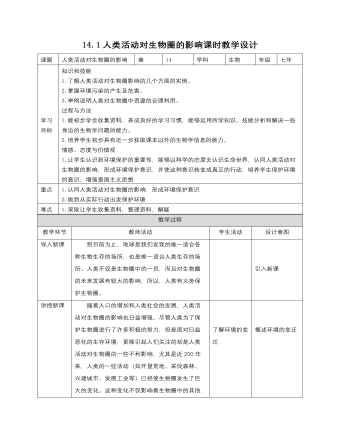
初中生物北师大版七年级下册《第14章第1节人类活动对生物圈的影响》教案
知识和技能 1.了解人类活动对生物圈影响的几个方面的实例。 2.掌握环境污染的产生及危害。 3.举例说明人类对生物圈中资源的合理利用。 过程与方法 1.能初步学会收集资料,养成良好的学习习惯,能够运用所学知识、技能分析和解决一些身边的生物学问题的能力。 2.培养学生初步具有近一步获取课本以外的生物学信息的能力。 情感、态度与价值观 1.让学生认识到环境保护的重要性,能够以科学的态度去认识生命世界,认同人类活动对生物圈的影响,形成环境保护意识,并使这种意识转变成真正的行动,培养学生保护环境的意识,增强爱国主义思想1.认同人类活动对生物圈的影响,形成环境保护意识 2.做到从实际行动出发保护环境1.采取让学生收集资料,整理资料,解疑
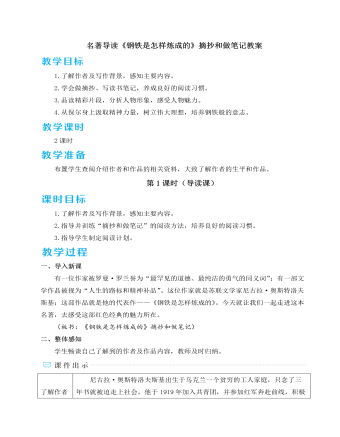
人教部编版语文八年级下册名著导读《钢铁是怎样炼成的》摘抄和做笔记教案
一团绿火像镁光似的在保尔眼前一闪,耳边响起了一声巨雷,烧红的铁片灼伤了他的脑袋。大地可怕地、不可思议地旋转起来,开始缓缓地向一旁倒下去。保尔像一根稻草似的被甩离了马鞍,越过马头,重重地摔倒在地。师:在那血与火的战争年代,保尔驰骋疆场,为革命事业浴血奋战,不惧牺牲。他那钢铁般的意志是在战火纷飞的疾苦中千锤百炼而成的。3.面对疾病师:病痛没有击垮保尔,面对自身的疾病,他是这样的——片段一:“……我受到一次又一次的打击。一次打击过后,我刚站起来,另一次打击,比上一次更无情的打击又来了。最可怕的是我无力反击。先是左臂不听使唤。这已经是够痛苦的了,谁知紧接着两条腿也不能活动。我原本就只能在室内勉强走动,现在甚至从床沿挪到桌子跟前也异常困难。可是,恐怕这还不算最糟的。明天会怎么样?谁也无法预料……”
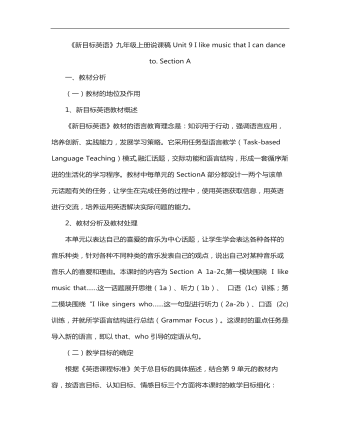
初中英语人教版九年级全册《Unit 9 I like music that I can dance to》说课稿
2、教材分析及教材处理本单元以表达自己的喜爱的音乐为中心话题,让学生学会表达各种各样的音乐种类,针对各种不同种类的音乐发表自己的观点,说出自己对某种音乐或音乐人的喜爱和理由。本课时的内容为Section A 1a-2c,第一模块围绕 I like music that……这一话题展开思维(1a)、听力(1b)、 口语 (1c) 训练;第二模块围绕“I like singers who……这一句型进行听力(2a-2b)、口语 (2c) 训练,并就所学语言结构进行总结(Grammar Focus)。这课时的重点任务是导入新的语言,即以that、who引导的定语从句。
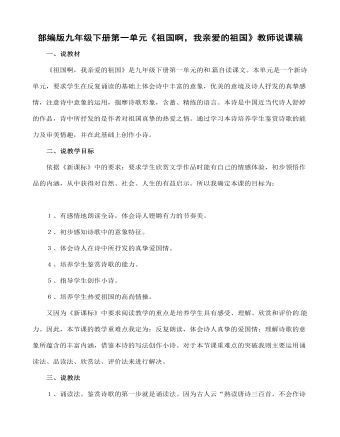
九年级祖国啊我亲爱的祖国说课稿
二、说教学目标 依据《新课标》中的要求:要求学生欣赏文学作品时能有自己的情感体验,初步领悟作品的内涵,从中获得对自然、社会、人生的有益启示。所以我确定本课的目标为:[来源:学_ 1、有感情地朗读全诗,体会诗人铿锵有力的节奏美。 2、初步感知诗歌中的意象特征。 3、体会诗人在诗中所抒发的真挚爱国情。 4、培养学生鉴赏诗歌的能力。 5、指导学生创作小诗。[来源:学科XK 6、培养学生热爱祖国的高尚情操。
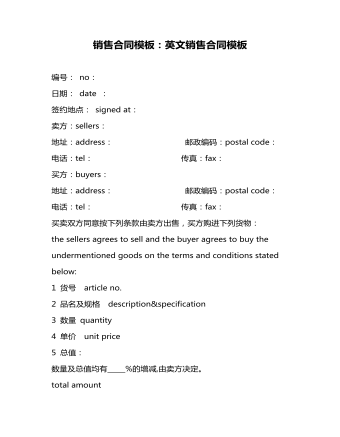
销售合同模板:英文销售合同模板
由于水灾、火灾、地震、干旱、战争或协议一方无法预见、控制、避免和克服的其他事件导致不能或暂时不能全部或部分履行本协议,该方不负责任。但是,受不可抗力事件影响的一方须尽快将发生的事件通知另一方,并在不可抗力事件发生15天内将有关机构出具的不可抗力事件的证明寄交对方。
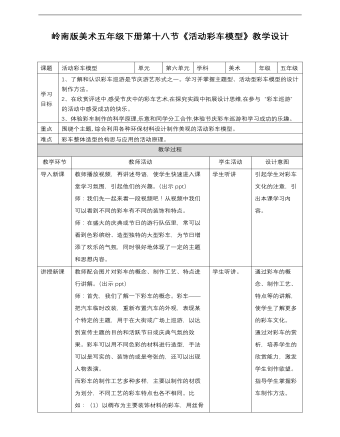
小学美术岭南版五年级下册《第六单元18活动彩车模型》教材教案
1、了解和认识彩车巡游是节庆游艺形式之一。学习并掌握主题型、活动型彩车模型的设计制作方法。 2、在欣赏评述中,感受节庆中的彩车艺术,在探究实践中拓展设计思维,在参与“彩车巡游”的活动中感受成功的快乐。 3、体验彩车制作的科学原理,乐意和同学分工合作,体验节庆彩车巡游和学习成功的乐趣。 围绕个主题,综合利用各种环保材料设计制作美观的活动彩车模型。 彩车整体造型的构思与应用的活动原理。 教师播放视频,再讲述导语,使学生快速进入课堂学习氛围,引起他们的兴趣。(出示ppt) 师:我们先一起来看一段视频吧!从视频中我们可以看到不同的彩车有不同的装饰和特点。 师:在盛大的庆典或节日的游行队伍里,常可以看到色彩缤纷、造型独特的大型彩车,为节日增添了欢乐的气氛,同时很好地体现了一定的主题和思想内容。
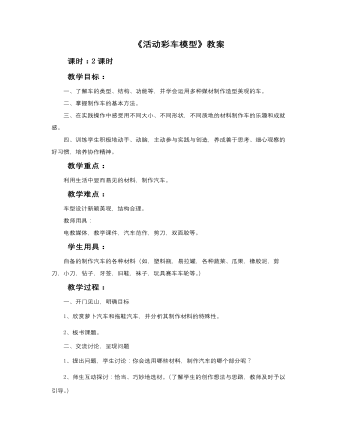
小学美术岭南版五年级下册《第六单元18活动彩车模型》教案
教学目标: 一、了解车的类型、结构、功能等,并学会运用多种媒材制作造型美观的车。 二、掌握制作车的基本方法。 三、在实践操作中感受用不同大小、不同形状,不同质地的材料制作车的乐趣和成就感。 四、训练学生积极地动手、动脑,主动参与实践与创造,养成善于思考、细心观察的好习惯,培养协作精神。 教学重点:利用生活中显而易见的材料,制作汽车。 教学难点:车型设计新颖美观,结构合理。 教师用具:电教媒体,教学课件,汽车范作,剪刀,双面胶等。学生用具:自备的制作汽车的各种材料(如,塑料瓶,易拉罐,各种蔬菜、瓜果,橡胶泥,剪刀,小刀,钻子,牙签,旧鞋,袜子,玩具赛车车轮等。) 教学过程: 一、开门见山,明确目标 1、欣赏萝卜汽车和拖鞋汽车,并分析其制作材料的特殊性。 2、板书课题。 二、交流讨论,呈现问题 1、提出问题,学生讨论:你会选用哪些材料,制作汽车的哪个部分呢? 2、师生互动探讨:恰当、巧妙地选材。(了解学生的创作想法与思路,教师及时予以引导。)
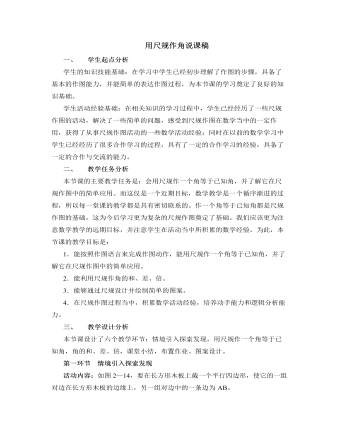
北师大版初中七年级数学下册用尺规作角说课稿
活动目的:通过两个图案设计,一个是让学生独立思考,借助于已经学习的用尺规作线段和角来完成,对本节课的知识进一步巩固应用;另一个是让学生根据作图步骤借助于尺规完成图案,进一步培养学生几何语言表达能力,并积累尺规作图的活动经验。活动注意事项:根据课堂时间安排,可灵活进行处理,既可以作为本节课的实际应用,也可以作为课下的联系拓广,从而使得不同层次的学生都学到有价值的数学。四、 教学设计反思1.利用现实情景引入新课,既能体现数学知识与客观世界的良好结合,又能唤起学生的求知欲望和探求意识。而在了解基础知识以后,将其进行一定的升华,也能使学生明白学以致用的道理、体会知识的渐进发展过程,增强思维能力的培养。同时,在整个探究过程中,怎样团结协作、如何共同寻找解题的突破口,也是学生逐步提高的一个途径。

人教版新课标PEP小学英语五年级下册My Favourite Season说课稿7篇
四、教学过程:为了实现以上教学目标,我从以下四个环节设计本课时的教学过程。(一)热身、复习在本环节我选用歌曲“What’s your favourite season?”作为新课的热身,使学生在轻松愉快的环境下接受英语的熏陶。通过Free talk环节谈论:How many seasons in a year? What are they? 对学生所掌握的知识进行滚动复习,同时又为新课做铺垫。(二)新知呈现为了更好地突出教学重点,分散难点,在这一环节将利用多媒体设置不同的任务来完成新知呈现。1、任务一:四季的色彩和景色课件展示春夏秋冬四季的图片。问学生:What colour is the spring/summer/fall/ winter?在学生回答后再向学生提问:What’s your favourite season? Why?请学生根据四季的“颜色”来选择自己喜欢的季节,引导学生用句型“Because I see…”来说出自己喜欢的理由。通过“I see…”这个角度,培养学生善于观察大自然,热爱大自然的情感。2、任务二:四季的天气和着装提问学生“What’s the weather like in spring/summer/fall/winter?”让学生通过谈论“天气和着装”来选择自己喜欢的季节,并能从生活实际出发,利用句型“Because I wear…”陈述喜欢的理由,进一步培养学生的思维能力。

人教版新课标PEP小学英语三年级下册Do you like pears说课稿9篇
第一环节:教师参与到其中的一个小组,用“Do you like…?”的句型提问,因为学生在上学期已经接触了“like”一词,现在又有了前面三次听的机会,对本课所要学的对话有了一定的感知,预计有部分学生会回答“Yes,Ido.或No,I don’t .”当学生回答“Yes,Ido.”时,我就说:“Here you are .”同时也将水果递给学生。在教师与学生、学生与学生的对话中,领悟了“Yes,Ido.”和“Here you are .”的意思。当学生回答“No, I don’t.” 时,教师不把水果递给他。通过这个过程的口语与演示,学生也会领悟到“No, I don’t.”的意思。同时,进行师问生答的口语操练。师生对话要适当增加,使学生对“Yes,Ido.和No, I don’t”的句型有更多的操练机会。这样,第一环节的目标也就达到了。第二环节:由师问生答的形式,变为生问师答。通过教师引导,让学生用“Do you like …”提问。因为,学生要把“Do you like …”的音读准,有一定难度。因此,在起先学生说这句式时,要发挥教师的主导作用,让学生跟读,注重学生发音的准确。

人教版新课标PEP小学英语三年级下册How many说课稿7篇
我随意走动,观察学生们用英语交流的情况,有困难的适时指导一下。学生们在完成任务的过程中,积极运用语言,激发了学习兴趣,同时还实现了与数学学科的渗透和联系。在这节课的最后,我布置了一个有层次的作业,让学生自主选择:①听录音,仿读会话;②分角色表演会话;③改编会话,分角色表演并录成磁带。分层次的作业,让不同程度的学生都能有事可做,都有表现自己的机会,体验到成功的喜悦,同时使学生的语言交际向课外延伸,使他们能带着动力,保持兴趣继续学习。总之,在这节课的教学设计中,我重视对新知识的铺垫和自然导入,通过多种方式的呈现,让学生们自然而然地学习新知识。充分利用游戏、合作交流等教学手段,让学生们饶有兴趣地操练语言、运用语言,在完成任务过程中巩固知识,运用知识,体验成功的喜悦,培育积极的学习情感,形成良好的学习策略,并将这些积极的因素带人下一步的学习当中。

人教版新课标PEP小学英语三年级下册My family说课稿6篇
(1)单词:father (dad), mother (mom), grandfather (grandpa), grandmother (grandma), man, woman(2)学唱英语童谣《Father and Mother》。难点:表示家庭成员单词的认读三、说学情三年级第二学期的学生,能够认读少量简单的单词;但是由于英语不是我们的母语,在日常生活中少于应用,学生学得快,忘得也快,在口语交流能力方面很差。因此,在教学中要结合学生的实际情况,采取有效的教学方法进行教学。四、说教法根据教学内容的特点,我在教学中①注重主题化整体设计,以family为主线贯穿始终,结合远程教育资源的利用,给学生创设一个轻松、愉快的学习氛围。②注重在课堂教学中充分体现“以学生为主体”的教学原则,营造“真实性”的语言环境和开放的空间,让学生在交际中学习运用。③在教学过程中设计各种教学活动,让他们在唱中学,在做中学,在玩中学,从而充分调动其学习兴趣,同时还注重培养学生各项能力训练。五、说学法


